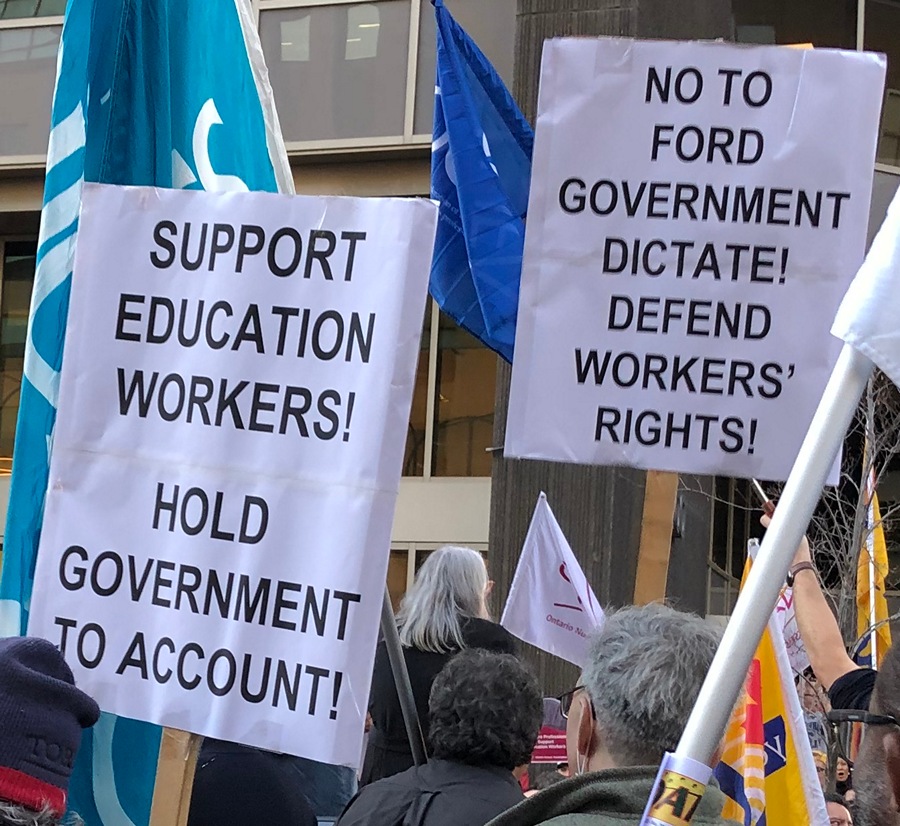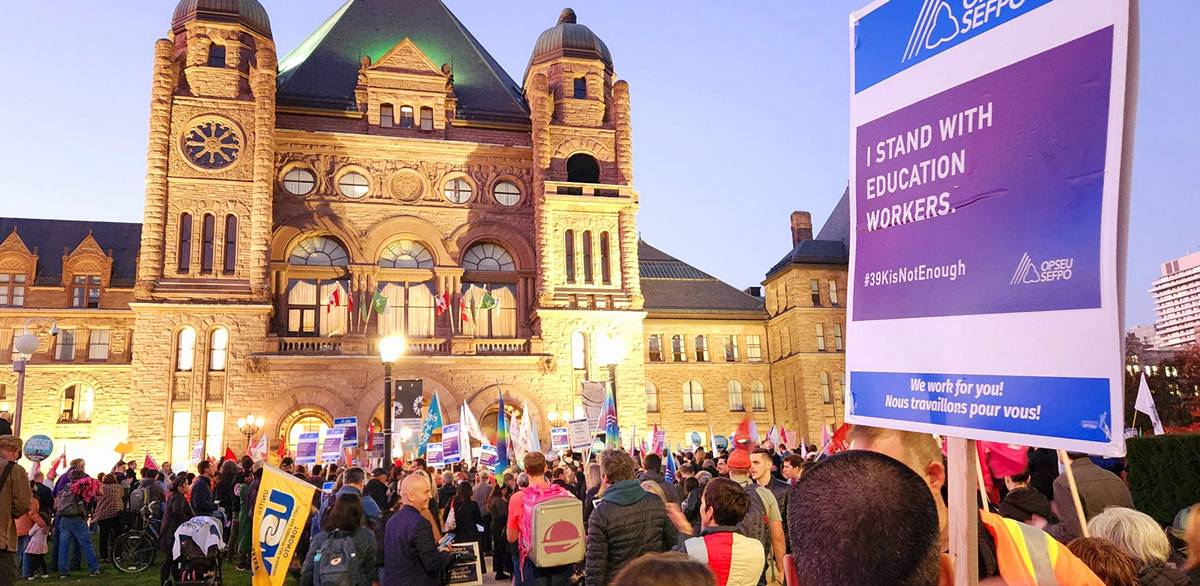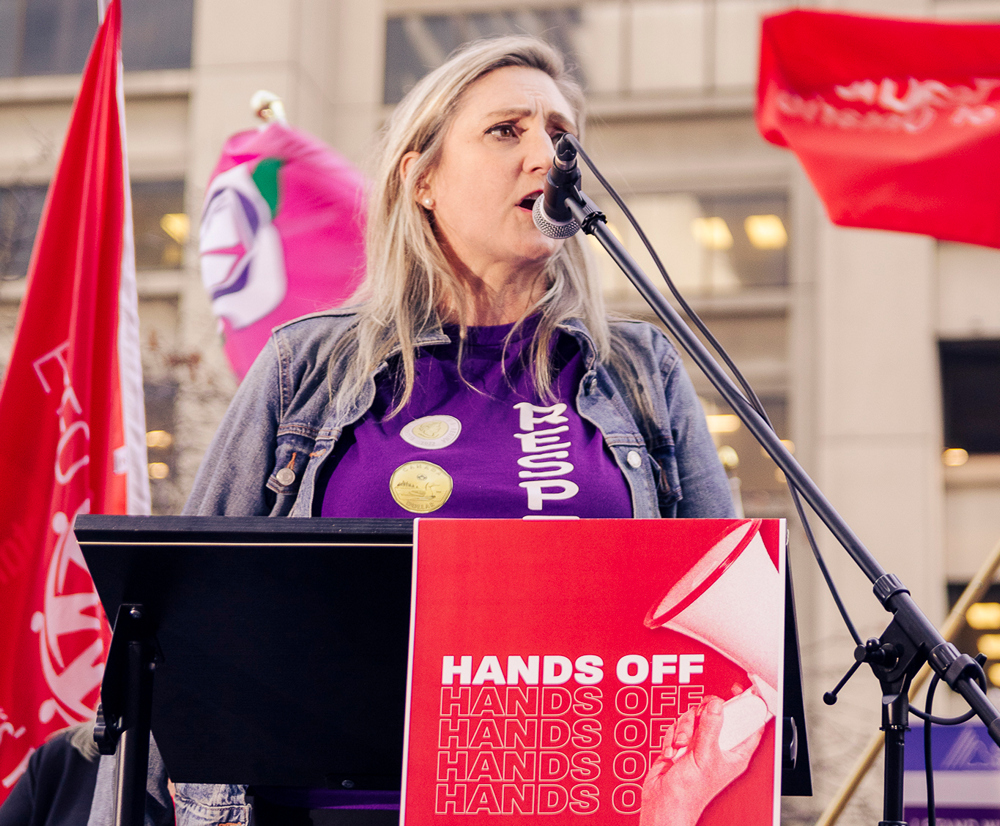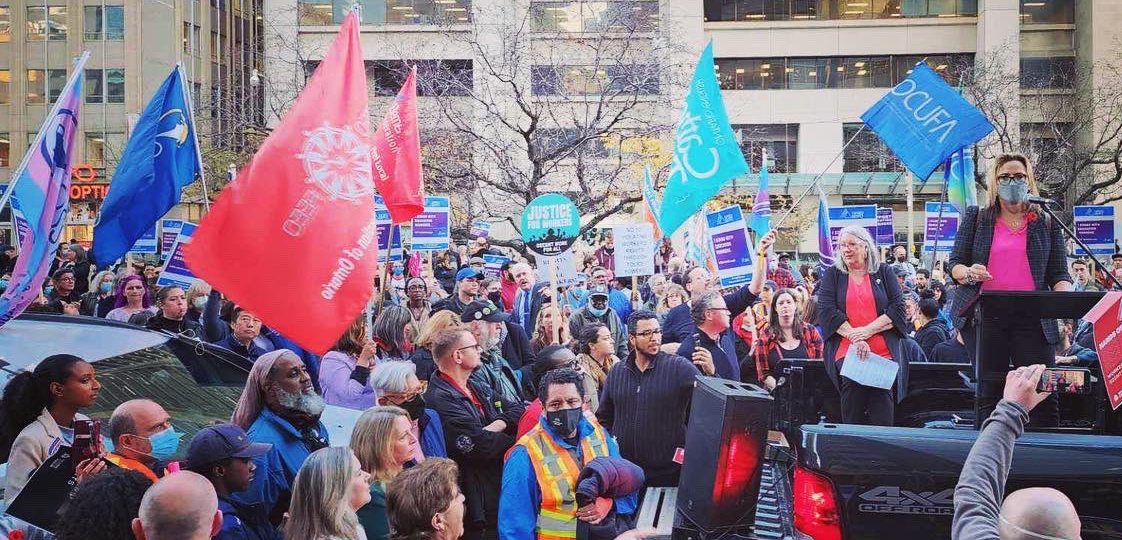Nomember 3, 2022 - No. 41
Stand as One with Education Workers in Ontario
Why
Ontarians Should Join the
Political Protests
Against Bill 28, the
Keeping
Students in Class Act

• Support Grows for Striking Education Workers
• OSBCU Central Bargaining Committee Explains Unacceptable Government Offer
• Who Said
What on Ontario's Bill 28, the
Keeping Students in Class Act
Stand as One with Education Workers in Ontario
Why Ontarians Should Join the Political Protests Against Bill 28, the Keeping Students in Class Act
The Ontario School Board Council of Unions (OSBCU) reported November 2 that "After tabling legislation designed to trample fundamental rights, Stephen Lecce told the media that the Ford government was done bargaining. It has been reported that the Ministry of Education is saying bargaining may resume if we make substantial movement and revoke the strike notice."
In response OSBCU said, "Bargaining never stopped. Our central bargaining committee is still at the table, as is the government and the Council of Trustees' Association. We hope to reach an agreement that invests in student success and ensures good jobs for workers. If a negotiated agreement that is fair for workers, students and families is not reached, strike action will proceed."
Today, in an update OSBCU stated: “This afternoon we were informed that mediation has concluded. Regardless of the attempts by your OSBCU Bargaining Committee to achieve a negotiated deal that respects the needs of workers, students & families, the Ford Conservative government would not make the necessary investments to achieve this deal. It is clear that this government never intended to negotiate. The time & effort they have spent on Bill 28, which strips away education workers' Charter rights, should have been spent on a deal that would have respected workers & ensured the services that students desperately need are secured.”
This underscores the treacherous nature of the Ford government and the essence of its Bill 28, under the misleading title Keeping Students in School Act. The bill passed the final reading in the legislature late in the afternoon of November 3 and becomes law as soon as it receives Royal Assent. Any government which can consider teachers and education workers enemies, declaring they do not want to keep students in school, deserves to be condemned. In fact, it condemns itself because it refuses to bargain in good faith and instead resorts to using its positions of power and its majority to blackmail and criminalize those who teach and look after the children and young people. The law it is passing gives it police powers against the people and shows the dangers Ontarians face going forward.
Attacking the most vulnerable section of those who work in the education sector is a despicable tactic because it relies on a dastardly belief that those who are better off will not support them or their union, in this case CUPE, and others who give the education workers union protection. This is how the attacks spearheaded by the federal government took place against the most vulnerable in the post office and also how poisonous sentiments are aroused against migrant workers, recent immigrants and refugees, claiming they are a burden on public services which should not be provided because doing so harms the majority. In this way high ideals are used to justify what cannot be justified.
Time and again, substantive issues are clouded over with divisive talk that it is all very well to support the most vulnerable workers, but "there is no money," which is false. It covers up who decides the direction of the economy and what money is spent on and who benefits from it. Instead, teachers are told that if education workers are to receive wages and working conditions according to what they say they require, it will come out of teachers' pay cheques. They are told that their unions' insistence on bargaining will disrupt the lives of teachers who are already stressed out.
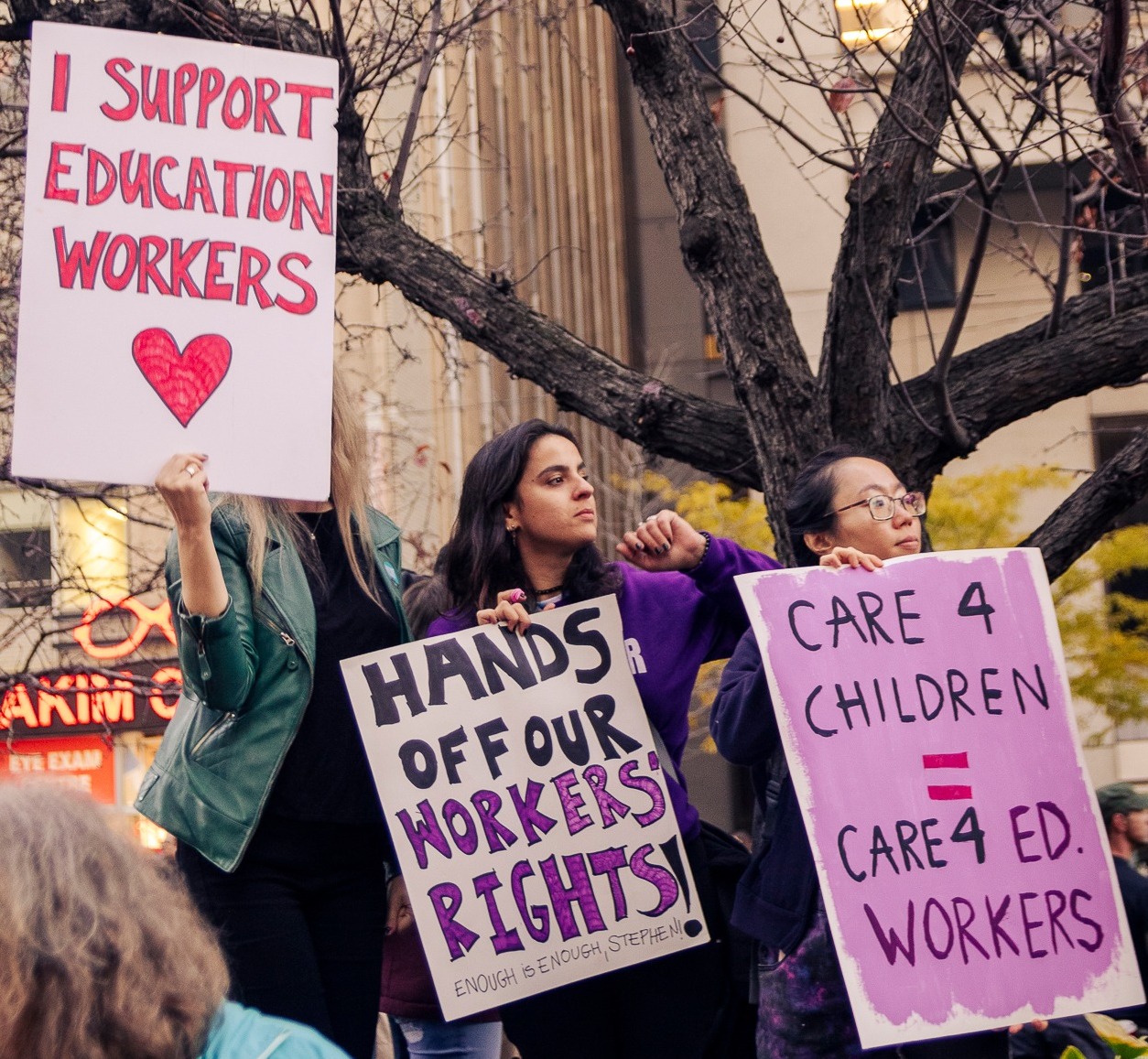 These
arguments and others are crude attempts to deny that teachers and
education workers and school staff at every level are one. Along with
students, and parents and guardians for that matter, they make up a
single whole the society depends on. Government attempts to deny there
is a society
and, on the contrary, enforce the dictate that everyone should fend for
themselves, are medieval, irrational and immoral. All Ontario unions
should condemn the Ontario government and unite their members to
condemn them. All organizations of the people in every sector of the
economy and people from
all walks of life should condemn what the government in Ontario is
doing.
These
arguments and others are crude attempts to deny that teachers and
education workers and school staff at every level are one. Along with
students, and parents and guardians for that matter, they make up a
single whole the society depends on. Government attempts to deny there
is a society
and, on the contrary, enforce the dictate that everyone should fend for
themselves, are medieval, irrational and immoral. All Ontario unions
should condemn the Ontario government and unite their members to
condemn them. All organizations of the people in every sector of the
economy and people from
all walks of life should condemn what the government in Ontario is
doing.
The workers and their union representatives have clearly declared that their protests are now political protests because the government has taken the issue outside of labour law into the political domain, the domain that concerns the entire polity. The use of the notwithstanding clause provided for by Canada's Constitution Act 1982 makes the Ford government’s claims of being democratic absurd. Invoking the exercise of police powers to force workers to submit to enslaving conditions will not do in a society which condemns authoritarian regimes abroad and parades as the great defender of democracy. Criminalizing the claims workers are within their right to make on society under the hoax that they endanger national security and the national interest is unacceptable.
OSBCU's position is courageous and righteous. It puts the lie to the Ford government's position blaming the union for the current crisis. It deserves everyone's support.
Support for the rights of education workers is support for the rights of all. All out to join the political protests against government disinformation and impunity.
Uphold the Dignity of Labour!
Support Grows for Striking Education Workers
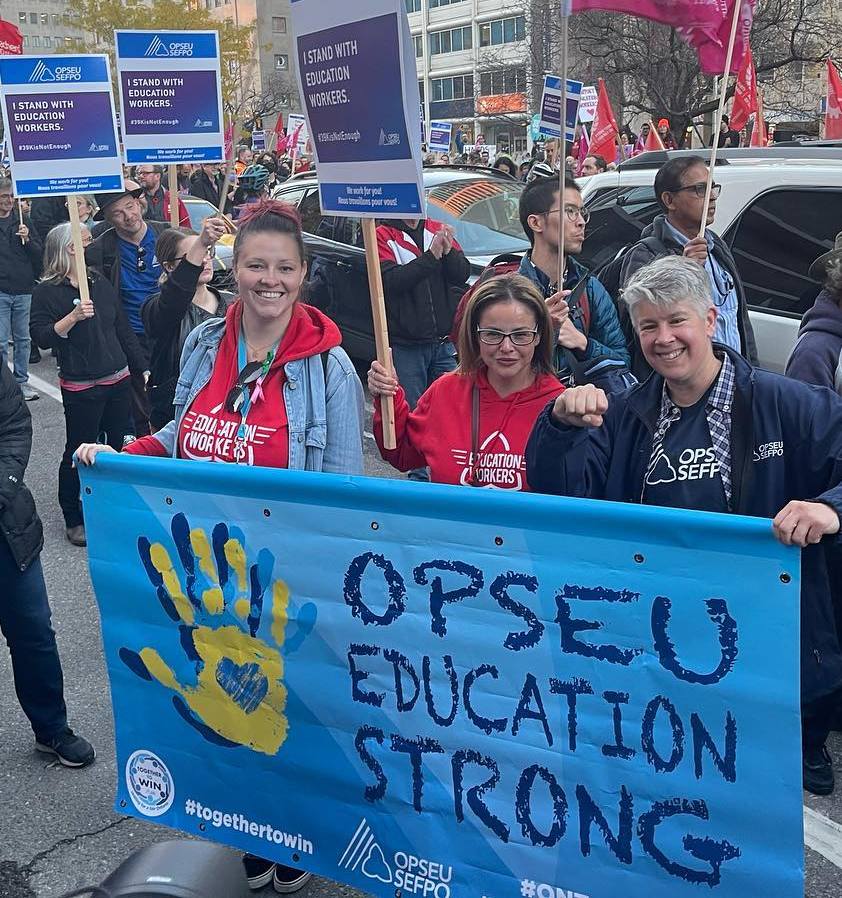 While mediation
ended on November 3 without a negotiated settlement
as the government refused to negotiate, support is growing for the
education workers of the Ontario School Boards Council of
Unions.
While mediation
ended on November 3 without a negotiated settlement
as the government refused to negotiate, support is growing for the
education workers of the Ontario School Boards Council of
Unions.
On November 3 the Ontario Public Service Employees Union announced that its 8,000 education workers will walk off the job Friday in solidarity with the 55,000 Canadian Union of Public Employees education workers who will engage in a political protest tomorrow. OPSEU represents close to 8,000 members working in boards of education as educational assistants, child and youth workers, designated early childhood educators, autism support workers, deaf blind interveners, lunch monitors, early childhood educators, clerical workers, IT specialists, Language Instruction for Newcomers to Canada (LINC) and ESL, among others.
A letter from OPSEU President JP Hornick sent to members stated: "We will support every OPSEU/SEFPO education worker who does not attend work this Friday. If you are not attending work, join the nearest CUPE picket rally, if you can."
"Your union will have your back. You will not have to pay any fines. And you will have the full force of OPSEU/SEFPO behind you should your employer attempt to enact any discipline.
"We have 8,000 education workers in our union. If you all walk out together on Friday, there is safety in numbers. Talk to your colleagues. Make plans with them to attend a nearby CUPE rally together.
"You didn't ask to be on the front lines of this fight, but you are strong. And we will have your back when you go out on Friday."
OSBCU Central Bargaining Committee Explains Unacceptable Government Offer
We are waiting for a response from the Council of Trustees' Associations (CTA) and the Ford government and remain at the table willing and ready, as we have been for the last five months, to negotiate a collective agreement that responds to the needs of students, parents, and workers.
The following explains what their offer was and how bad it was for the lowest-paid education workers.
Sunday, the Ontario School Board Council of Unions' central bargaining committee was presented with a final pass from the Ministry of Education. We were told that if we did not accept this offer, the Conservative government would introduce legislation and impose it.
Since then, we've seen a number of misconceptions and fallacies about the government's offer. The central bargaining committee is writing this statement to correct those errors.
Stephen Lecce claims that the government's latest offer is generous and meets the needs of workers. This is not true. While the wage increase numbers may look like an improvement over their previous offer, the way they structured the offer -- that they intend to impose -- would push more workers into poverty.
Government Claim #1:
Many
workers who earn less than $43,000 will receive 2.5 per cent
Fact: An educational assistant at Toronto Catholic District School Board is paid $26.21 an hour. They work 32.5 hours a week for 43 weeks a year and only earn $36,628 annually. They would only get a 1.5 per cent increase, or an additional 39¢ an hour.
The majority of workers would not get 2.5 per cent -- because the language in the government's proposal is not based on individual earnings but rather pay scale or hourly wage rate, leaving many workers who earn less than $43,000 (or $25.95 per hour) receiving only 1.5 per cent.
Here are some other examples:
An early childhood educator at Limestone District School Board earns $27.74 an hour. They work 30 hours a week for 43 weeks of the year and end up earning just $35,785 annually. They too would only receive a 1.5 per cent increase, or 42¢ an hour more.
A personal support worker at Waterloo Catholic District School Board earns $25.97 an hour -- just two cents over the cutoff salary in the government's offer. They work 32.5 hours a week for 43 weeks of the year and are laid off for the rest of the time. They make just $36,293 a year -- well below the government's talking point of $43,000 -- but they will only receive 1.5 per cent from the government's offer. That amounts to just $0.39 more an hour.
Government Claim #2:
Workers
earning less than $43,000 a year or $25.95 per hour
will receive 2.5
per cent
Fact: Caretaker staff at the Algoma District School Board top out at $27.05 an hour. Their starting wage is $23.02 an hour. No matter their earnings, because of the top rate in their pay grid, they will receive just 1.5 per cent
School board jobs are subject to a pay grid. New workers receive one salary; those with years of experience receive another. The government offer provides wage increases based on the top rate in the wage grid. That means that if a worker's grid goes up to higher than the cut off of $25.95 per hour but they currently earn less, they will only receive 1.5 per cent.
Here are two more examples:
Custodian staff with the Durham Catholic District School Board can eventually earn $29.62 an hour but start at just $24.85. They will also receive just 1.5 per cent under the offer the Ford government intends to impose.
Elementary school secretaries with the Halton Catholic District School Board can earn up to $28.39. This legislation would only give 1.5 per cent to workers who start at $25.92.
All told, substantially more than half of CUPE's 55,000 education worker members -- the lowest paid education workers in the sector -- would only get 1.5 per cent. This proposal is not intended to offer a fair wage increase. Simply put, it does not work for workers.
Government Claim #3:
The
OSBCU is including part-time workers to make their pay
appear worse
than it is
Fact: From the beginning, we have been clear and consistent. We're fighting for a flat rate wage increase across all jobs and all school boards because our members earn, on average, only $39,000 a year. This is absolutely true.
The government has responded that the average salary of full-time employees is much higher.
The lowest-paid in the sector, frontline education workers work the hours they are permitted to work by management -- their school boards.
Approximately 65 per cent of education workers are laid off every year.
Our proposals would guarantee more full-time work in schools and ensure that early childhood educators and educational assistants, for example, aren't having their labour stolen by providing unpaid prep time.
Instead of addressing the under-employment of education workers which would in turn ensure better services for students, the Ford government fails to provide the additional funding that is needed to increase the hours of services and improve the working conditions for workers who are casual, temporary, and part-time.
Government Claim #4:
Bargaining is finished unless education workers rescind their strike
notice
Fact: After tabling legislation designed to trample fundamental rights, Stephen Lecce told the media that the Ford government was done bargaining. It has been reported that the Ministry of Education is saying bargaining may resume if we make substantial movement and revoke the strike notice.
Bargaining never stopped. Our central bargaining committee is still at the table, as is the government and the Council of Trustees' Association. We hope to reach an agreement that invests in student success and ensures good jobs for workers. If a negotiated agreement that is fair for workers, students and families is not reached, strike action will proceed.
Who Said
What on Ontario's Bill 28, the
Keeping Students in Class Act
The Ford government used its majority in the Ontario Legislature on October 31 to introduce Bill 28, the Keeping Students in Class Act. To speed its passage through the Legislature and to ram it through second and third reading, it adopted a motion to have the Legislature sit starting at 5:00 am on November 1. For the information of readers we are posting below brief reports of what various forces said about the Bill.
Minister of Education Stephen Lecce delivered the government's pathetic argument which claims the Bill serves the students. He said; "Students are finally back in class catching up, following two years of pandemic disruptions. We are disappointed that CUPE is refusing to compromise on their demand for a nearly 50 per cent increase in compensation, representing a price tag close to $19-billion if extended across the sector ... CUPE has now made the decision to strike, putting their own self interest ahead of Ontario's nearly two million children, who deserve to stay in class learning. We are delivering on our promise to parents that our government will do whatever it takes to keep students in class, so they can catch up and get back to the basics of learning."
The Ontario School Boards Council of Unions Bargaining Committee pointed out: "Today the Provincial government tabled legislation that would impose our collective agreement terms and force workers further into poverty. Hours later, Stephen Lecce said the government is no longer interested in bargaining.
"The OSBCU's central bargaining committee remains committed to negotiating an agreement that invests in workers and students. While the bill is being debated, we're asking all workers, parents, and community members to make their voices heard by calling their MPP and joining us on the picket line on Friday, November 4."
The Elementary Teachers' Federation of Ontario (ETFO) President Karen Brown said: "On behalf of ETFO's 83,000 members, I want to say that we unequivocally condemn the Ford government's imposition of a concessionary contract on some of the lowest-paid education professionals working in Ontario's schools. ETFO stands with CUPE members and their right to strike for better pay and working conditions, and not with a regressive government that is cloaking anti-labour legislation as being pro-education.
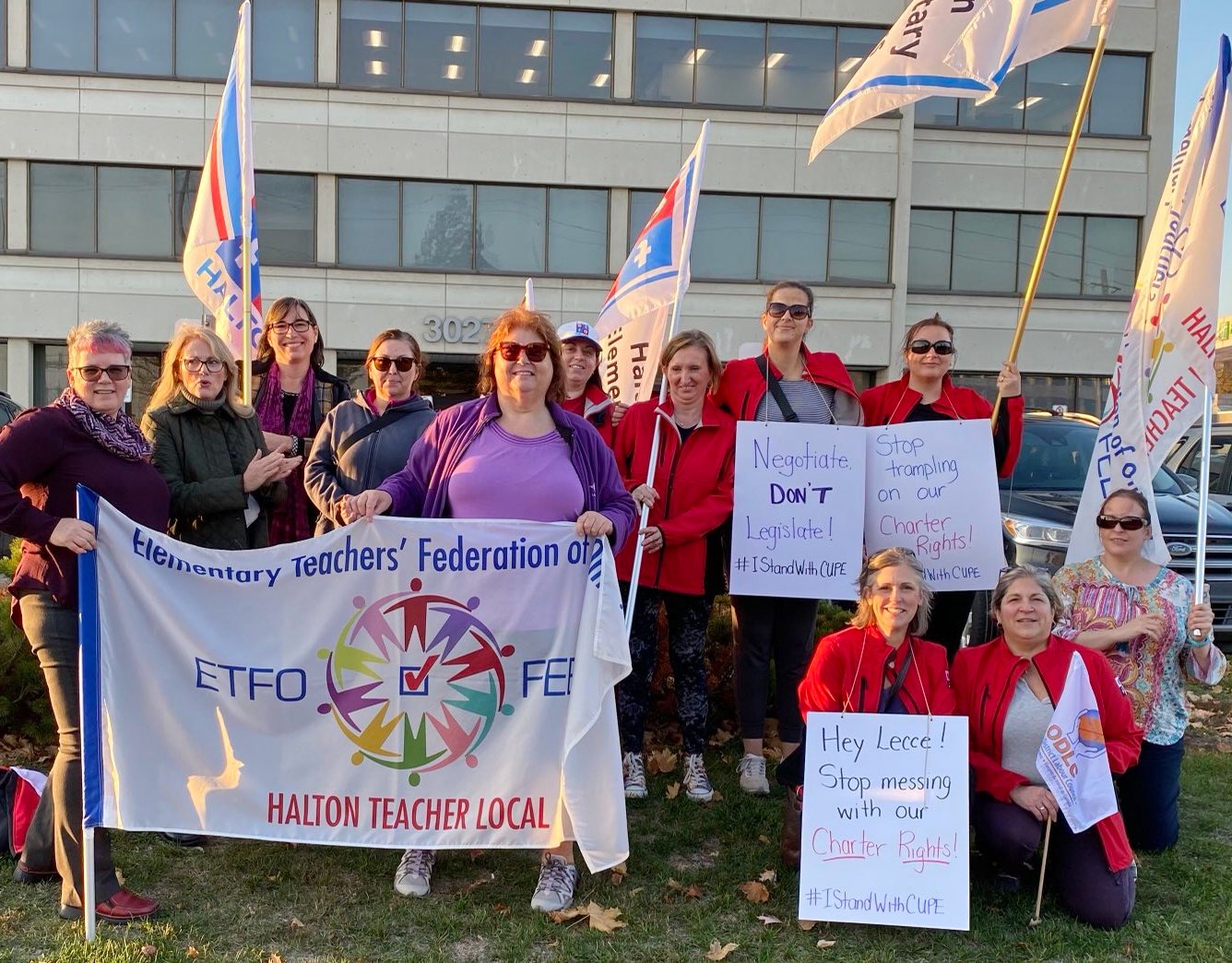 "Today,
on October 31, ETFO had a central bargaining date. Unfortunately, today
is the day the Ford government is tabling back-to-work legislation that
undermines the free and fair collective bargaining process for 55,000
CUPE members. On this of all days, ETFO could not, in good conscience,
sit
across the table from the government, and so we ended negotiations for
the day.
"Today,
on October 31, ETFO had a central bargaining date. Unfortunately, today
is the day the Ford government is tabling back-to-work legislation that
undermines the free and fair collective bargaining process for 55,000
CUPE members. On this of all days, ETFO could not, in good conscience,
sit
across the table from the government, and so we ended negotiations for
the day.
"In creating legislation that imposes a contract on CUPE members, the Ford government has chosen the most draconian manner of legislating away two fundamental rights protected by the Canadian Charter of Rights and Freedoms: the right to bargain collectively, and the right to strike.
"Today, the Ford government has signalled it is uninterested in reaching collective agreements that are negotiated freely and fairly. And its oppressive use of the notwithstanding clause is another flagrant abuse of power -- one that continues to attack democracy by trampling on Ontarians' constitutional rights.
"The Supreme Court of Canada has confirmed that collective bargaining, as well as the ability to strike to support bargaining efforts, are constitutionally protected rights that should not be legislated away by governments that want to avoid the inconvenience of negotiations.
"This is a move by the Ford government to curb the ability of education workers in this province to effectively advocate for much-needed improvements in public education. It is not only an outrageous assault on our CUPE colleagues, but also a blow to the morale of all education workers in this province."
The Ontario Secondary School Teachers' Federation (OSSTF) President Karen Littlewood said: "OSSTF/FEESO, representing more than 60,000 members across Ontario, stands in solidarity with CUPE's members and their goal of negotiating a fair deal. The Ford government has taken away these workers' constitutional right to bargain for improved working and learning conditions.
"The Ford government's use of the notwithstanding clause clearly demonstrates how unfair this legislation is to CUPE's predominantly female education workers. They make an average of $39,000 and will have now been subjected to nearly a decade of significant wage restrictions.
"OSSTF/FEESO's focus remains on our negotiations and making progress at the bargaining table for our education worker and teacher members. We continue to call on the Ford government to work within a fair process that respects and upholds all workers' Charter rights, and to invest in public education and negotiate a fair deal that meets the needs of frontline education workers, students, and their families."
The Ontario English Catholic Teachers Association (OECTA) President Barbara Dobrowolski said: "Catholic teachers join in solidarity with the Ontario School Board Council of Unions' (OSBCU) 55,000 Canadian Union of Public Employees (CUPE) education worker members, as they fight for a fair agreement that supports their frontline education workers and the students they serve, free from the Ford government's heavy-handed legislative interference.
"The Ford government's decision to use legislation to impose a collective agreement violates the Charter rights of OSBCU members to free, fair, and meaningful collective bargaining. Furthermore, the use of the notwithstanding clause to further trample workers' constitutional rights is shameful, but not unexpected. This is a government with a long history of repeatedly and deliberately neglecting students, families, education workers, and teachers, turning its back on all Ontarians.
"The Ford government failed Ontarians during the pandemic, when its irresponsible mismanagement led to the longest in-person learning disruption in North America. It failed Ontarians when it previously invoked the notwithstanding clause for the first time in the province's history through Bill 307 to silence Ontarians, in an attempt to shield itself from legitimate criticism. It failed Ontarians when it prioritized $365 million in one-time payouts, instead of the real investments students desperately need for a robust learning recovery. And it failed Ontarians by doubling down on plans to shortchange students by underspending on education by almost $6 billion over the next five years, as recently uncovered in a report by Ontario's Financial Accountability Office (FAO). The same FAO report projects a budget surplus this year, and further surpluses for the next five years, eventually growing to $8.5 billion – raising questions as to why the Ford government keeps prioritizing austerity at the cost of student well-being and success.
"The Ford government's decision to legislatively impose a contract on OSBCU education workers, and to invoke the notwithstanding clause for the second time in Ontario's history, is another flagrant abuse of power.
"As Catholic teachers, we remain committed, as always, to working throughout the bargaining process to realize a fair agreement that achieves the best for our students, teachers, and families, recognizing that educators' working conditions are our students' learning conditions.
"But we need a partner in government that values publicly funded education and the collective bargaining process – the free, fair, and meaningful exchange of ideas that strengthens schools, improves learning conditions, and respects workers' rights.
"Ontario's educators know what students need to succeed. It is past time that the government listened to and respected educators' voices, which is why we urge Premier Doug Ford to immediately abandon this draconian legislation and to commit to working collaboratively to achieve fair agreements that support all educators and students."
l'Association des enseignantes et enseignants franco-ontariens (AEFO) President Anne Vinet-Roy pointed out: "AEFO opposes the bill introduced today by the Ford government against CUPE members who are part of the support staff of schools in the province. We stand and will stand in solidarity with CUPE members. Although this deplorable bill seems to affect only CUPE bargaining, we believe that its impact could be felt by the other education unions in the province, including the AEFO.
"In fact, instead of following a collaborative negotiation process, based on mutual interests, the government is ready to unleash heavy legislative artillery to interfere with the constitutive rights of a union and prevent it from using legal and legitimate means of pressure. The bill specifies that no legal recourse is permitted for the next four years. If this bill becomes law, the law would be applied despite the provisions of sections 2, 7 and 15 of the Canadian Charter of Rights and Freedoms and despite the Human Rights Code.
"We deplore the government's strategy to achieve its ends, which does nothing to strengthen the publicly funded education system, and we urge Premier Doug Ford to immediately drop this punitive bill.
"The AEFO will continue to negotiate in good faith, in a fair and equitable manner, and expects the government to do the same for the renewal of the collective agreements of Franco-Ontarian education workers. The academic success of students and the stability of the education system must continue to be at the forefront of the concerns of everyone at the central negotiating table."
Ontario Federation of Labour (OFL) President Patty Coates stated: "Today is a dark day for Ontario workers. By introducing this legislation before education workers have even exercised their Charter-protected right to strike, the Ford government is attempting to short-circuit the bargaining process and strip workers of a fundamental freedom.[...] Doug Ford and his government are once again telling workers across the province that their rights don't matter."
"The labour movement calls on the government to withdraw this legislation, get back to the bargaining table, and negotiate in good faith. Education workers deserve a fair deal, not a contract imposed on them by law," added Coates.
"The Keeping Students in Class Act is an attack on every union member, every worker, every student, and every parent in this province. If we allow Doug Ford to get away with it, all other workers will face the same threat: contracts imposed by law instead of free collective bargaining. We won't let it happen. We will defend the right to fight for our schools, good jobs, decent wages, and a better life."
Canadian Labour Congress (CLC) President Bea Bruske said: [...] "Ford's legislative attack on workers is relentless. The Ontario government is well aware that this legislation is a direct violation of the rights of workers. Using the notwithstanding clause to rob workers of the right to free and fair collective bargaining is despicable.
"Canada's unions urge the Ford government to get back to the bargaining table and offer these workers the fair deal they deserve. We stand in solidarity with CUPE members ready to go on strike this Friday, in their battle for long overdue wage increases and better working conditions."
Unifor National President Lana Payne said: "Minister Lecce must meet [CUPE] at the table, not unlawfully revoke their right to strike ... Unifor will be behind these workers and all workers who stand up against the Ford government's unprecedented attempt to diminish worker's rights to bargain better working conditions."
Unifor Ontario Regional Director Naureen Rizvi said: "This is a dark day for workers' rights in Canada. Workers must have a say in our own working conditions. Without the right to strike, we are all subject to the whim of the boss, or in this case, of Minister Lecce, to set our working conditions. [...]Unifor members across Ontario are preparing to stand with CUPE workers as they demand that Lecce negotiate instead of legislating."
Ontario Public Service Employees Union (OPSEU) President JP Hornick said OPSEU/SEFPO stands with CUPE as they take this historic action against the Ford government. Hornick called on members to take action. She said:
"It is important to fight back against a government who would rather divert $365 million from desperately needed classroom funding to make small, one-time payments to parents for private tutors. That money should be invested in schools and programs – and the education workers who support students at school."
The Ontario Nurses' Association (ONA) said it "stands in solidarity with Ontario's education workers and the Canadian Union of Public Employees in their pursuit of a respectful and fair new collective agreement.
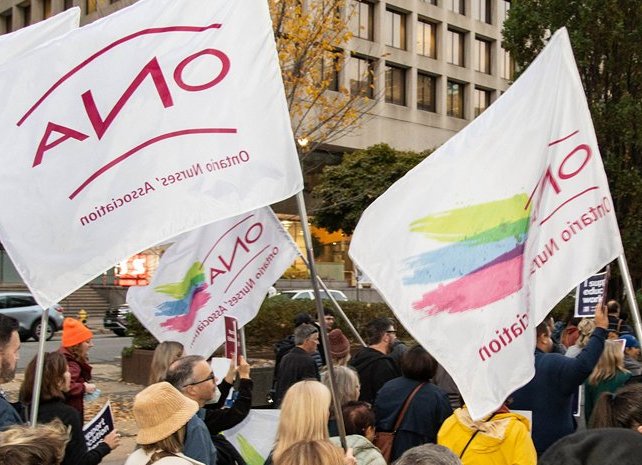 "ONA
believes the Ford government's repeated use of the notwithstanding
clause demonstrates a wanton disregard for the rights of union members
to freely and fairly negotiate; it is a chilling and arrogant move by a
government that has repeatedly shown its disdain for female-dominated
professions
and the vital work they do. The government's decision to pre-emptively
legislate these workers back to work, impose a contract and prevent
them from taking job action undermines a long-respected and legal
process.
"ONA
believes the Ford government's repeated use of the notwithstanding
clause demonstrates a wanton disregard for the rights of union members
to freely and fairly negotiate; it is a chilling and arrogant move by a
government that has repeatedly shown its disdain for female-dominated
professions
and the vital work they do. The government's decision to pre-emptively
legislate these workers back to work, impose a contract and prevent
them from taking job action undermines a long-respected and legal
process.
"This is yet another example of this government attacking historic basic labour freedoms in this province. ONA encourages all unions and all workers to join the fight to defend these basic rights and freedoms."
The executive director of the Canadian Civil Liberties Association, Noa Mendelsohn Aviv, said in a statement that the notwithstanding clause was "never meant to be used in contract negotiations, or as a casual tool to disrupt basic human rights safeguarded in our Charter."
"This misuse, and the flagrant disregard for individual rights is wrong and it is dangerous to our constitutional democracy."
A principal at Appiah Law Employment and Labour Counsel in Toronto Rich Appia said, "If the public is sympathetic to the government [in this case], then the government's actions will have set a significant precedent for years to come.[...]It's taking away a constitutionally protected right, and it'll be up to the people to decide whether they are on side with that."
York University professor specializing in labour and employment law David Doorey said "there has been only one other Canadian use of the notwithstanding clause in back-to-work legislation — in Saskatchewan in the 1980s. But the law has changed dramatically since then. [...] Today, the Charter protects a right to collective bargaining and to strike. As a result, the Ontario government requires the notwithstanding clause to protect itself from a lawsuit."
A managing partner at Monkhouse Law in Toronto, Andrew Monkhouse, said that the invoking of the notwithstanding clause takes away the historic compromise between unions and employers that makes strikes legal but predictable and added, "I imagine that in a world where unions felt that the historical compromise was not being followed, they might choose to resort [to] what would be called a wildcat strike." He said that unions would likely see the situation as "If they're not going to follow what [we] see as the law, we won't either." He said further fallout from the decision will depend on how far the provincial government is willing to go. "I mean, are they really going to be putting labour organizers in jail for going on a strike when they've been legislated back to work under the notwithstanding clause?" He said once the government opens the "Pandora's box" of using the notwithstanding clause during collective bargaining, it will be difficult for unions not to consider it part of every negotiation -- including seeking assurances in their collective agreements that it will not be invoked.
Constitutional and labour lawyer in Ottawa Paul Champ, said the Supreme Court of Canada made it clear in 2007 and 2015 that the right to collective bargain and to go on strike can only be infringed on in very serious circumstances -- and that that hadn't happened yet in this case.
"There hasn't really been a fundamental breakdown in negotiations," he said before it was clear the province would use the notwithstanding clause. "The province hasn't tried to come up with some other way to arbitrate their disputes." Champ noted the case of the B.C. Teachers' Federation in which "the province [of BC] was ordered to compensate teachers going back years, not only for the value of what their collective agreement could have been, but also other damage through the mitigation of their Charter right."
Ontario New Democratic Party Education critic Chandra Pasma said "Doug Ford and Stephen Lecce have brought us to the brink of disruption in our schools, and they're the only ones who can stop the clock on this countdown. All they have to do is come to the table with a fair offer that respects the hard work of our lowest-paid education workers, who make $39,000 on average.
"The people who drive school buses and clean classrooms are being forced to use food banks while Mr. Ford racks up multi-billion-dollar surpluses and schemes to shortchange education by billions more. Our kids need more support in school to catch up after the pandemic, not less. But our kids will have less support if Mr. Ford keeps chasing education workers away with low wages. Mr. Ford created a staffing crisis in hospitals by holding back people's wages, and now he's doing the exact same thing in our schools.
"Education workers deserve a decent wage, and our children deserve a government that invests in ensuring there are enough caring adults in their schools. Ford and Lecce must offer a fair deal to stop disruption to our kids' school year."
Interim Leader of the Ontario Liberal Party John Fraser said: "Doug Ford has made it very clear he will go to any length to undervalue and underpay our critical frontline workers." "The evocation (sic) of the notwithstanding clause to prematurely end negotiations is an egregious abuse of power and an overt assault on our democracy ... The trampling of Charter rights has become a standard practice in Doug Ford's Ontario.... Ontario Liberals will do everything in our power to end the government's attack on working people and defend the rights of education workers."
Ontario Liberal Party Education Critic Mitzie Hunter said "It is unacceptable that some of the most important workers in our education system, who are among the lowest paid in the sector, are struggling to put food on the table -- at the same time the government posts a $2.1 billion surplus and is on track to underfund our education system by a further $6.0 billion."
Green Party of Ontario leader Mike Schreiner said the bill "takes a chainsaw to the Charter rights of education workers" by invoking the Charter's notwithstanding clause to impose a contract on education workers. "These education workers do extraordinary work under difficult conditions. But it is hard to do that work as well as they can because these workers are struggling so much in their own lives to pay the rent and put food on the table with some earning as little as $39,000 a year. Half of these workers have to work a second job to make ends meet, many rely on food banks to eat. I want schools to be open, education workers want schools to be open, and we want those schools to be safe, clean and staffed by fairly paid workers who can and will focus on student support and success. That won't happen with a government attacking education workers' Charter rights and forcing them to live on wages that don't pay the bills."
Prime Minister Justin Trudeau told CBC News that "using the notwithstanding clause to suspend workers' rights is wrong. The suspension of peoples' rights is something that you should only do in the most exceptional circumstances, and I really hope that all politicians call out the overuse of the notwithstanding clause to suspend peoples' rights and freedoms."
A Toronto Star editorial said:
"No doubt, we all want to spare students, teachers and all education workers any more classroom interruptions.
"But the virtue of that objective doesn't justify this offensive overreach by the Ford government. It's a cop out. And the invocation of the notwithstanding clause is an admission that the government knows it's wrong and that its legislation likely wouldn't survive a legal challenge.
"The give-and-take of negotiations are an essential part of a unionized workplace. Strike deadlines are part of the bargaining process. They focus negotiations, and bring the pressure that is often necessary to spur talks, force moderation of demands and bring about the compromises needed for agreement.
"In 2012, then Premier Dalton McGuinty's Liberal government imposed a contract on teachers' unions to avoid a strike. That legislation was challenged in court. In 2016, Justice Lederer ruled that the provincial government had "substantially interfered" with teachers' right to collective bargaining.
"The Ford government would do well to avoid making the same mistake. Lecce claims his government had "no other choice." Lecce and his cabinet colleagues do have a choice. They need to stop their bully tactics.
"The union says it will go ahead with a protest on Friday in defiance of the proposed legislation. Obviously, no one wants a strike. With CUPE workers among the lowest paid in schools, and after a pandemic in which education workers were exposed to enormous risk and upheaval, surely now more than ever government and the union should be doing all it can to negotiate in good faith.
"We know the pandemic and the time away from classes took a heavy toll on students, their academic performance and their mental health. That should be all the motivation the government and the union need to resolve this labour dispute -- at the bargaining table."
(To access articles individually click on the black headline.)
Website: www.cpcml.ca Email: editor@cpcml.ca

